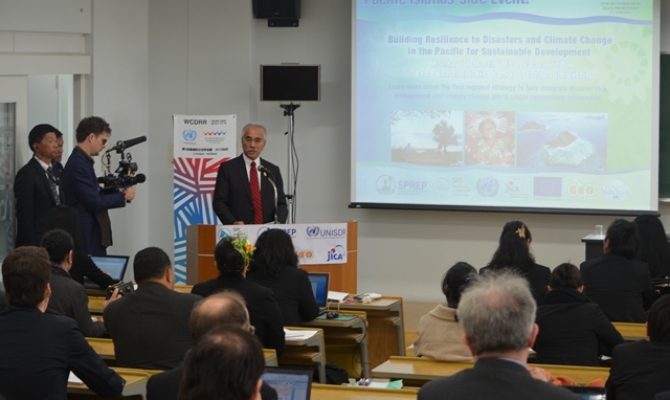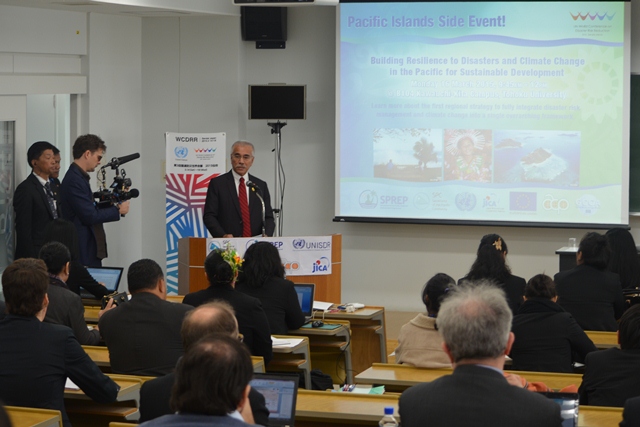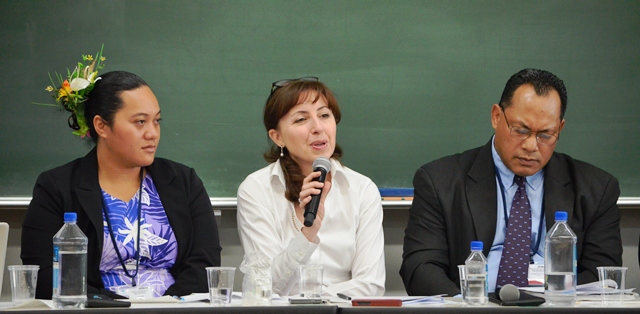
Climate Change Resilience
17 March 2015, Sendai, Japan - With Category 5 Tropical Cyclone Pam dominating world headlines, there has been strong interest in the Pacific Islands at the Third UN World Conference on Disaster Risk Reduction in Sendai Japan.
Showcased at a special Pacific Islands event 'Building Resilience to Disasters and Climate Change in the Pacific for Sustainable Development', H.E President Anote Tong of Kiribati highlighted the devastating impacts in Vanuatu, Solomon Islands, Tuvalu, Republic of Marshall Islands, and Kiribati after Tropical Cyclone Pam. He stressed the importance of bringing climate change and disaster risk management together for the Pacific region noting that category five cyclones in the region have been more frequent over the last 10 years.
 President of Kiribati H.E Anote Tong
President of Kiribati H.E Anote Tong
"Natural disasters and climate change are inter-related and integrated – they cannot and should not be taken as separate entities, for if we do, we can never fully achieve inclusivity and we can never hope to have sustainable development for reasons that are obvious."
Labelled as pioneers, the island region is the very first to develop an integrated strategy that brings climate change and disaster risk management together under a regional framework in the context of sustainable development.
The regional efforts on integrating climate change and disaster risk management were featured in the Pacific Islands Side Event organised by the Secretariat of the Pacific Community (SPC), the Secretariat of the Pacific Regional Environment Programme (SPREP) and the United Nations Office for Disaster Risk Reduction (UNISDR).
The event highlighted the need for all stakeholders to work together to address the impacts of climate change and disaster risks in the Pacific region.
 Deputy Prime Minister of Tonga, Hon. Siaosi Sovaleni
Deputy Prime Minister of Tonga, Hon. Siaosi Sovaleni
Tonga's Deputy Prime Minister, The Hon, Siaosi Sovaleni, championed the need to 'build better now' as well as 'build back even better' after a disastrous event based on experiences, information and lessons learnt in preparation, responding and recovery from a disaster.
The leadership of the Pacific community was commended by the Head of Climate Change, Environment, Natural Resources, and Green Economy Unit of the European Union, Mrs Cristiana Pasca Palmer, who acknowledged the extensive consultation for the strategy which has gained buy-in from a broad range of stakeholders especially the private sector.
The important role of civil society in building climate and disaster resilience was highlighted by Mr Setareki Macanawai, Chief Executive Officer and Pacific Disability Forum. He also acknowledged the importance of consideration of 'vulnerable groups', which should be identified as 'valuable groups'.
The global context for the work being undertaken in the Pacific was outlined by Dr. Kazuo Matsushita Professor Emeritus, Kyoto University, and Senior Fellow, Institute for Global Environmental Strategies (IGES) who pointed out that the efforts of the Pacific are in line with global trends.
 L - R Ms. Inangaro Vakaafi, Mrs. Cristiana Pasca Plamer, Mr. Kosi Latu
L - R Ms. Inangaro Vakaafi, Mrs. Cristiana Pasca Plamer, Mr. Kosi Latu
The Side Event was sponsored by the Japan International Cooperation Agency (JICA) and was moderated by Cristelle Pratt, Deputy Secretary General of the Pacific Island Forum Secretariat. The discussion panel included the Honourable Deputy Prime Minister for Tonga, Siaosi Sovaleni; Mrs Cristiana Pasca Palmer, Head of Climate Change, Environment, Natural Resources, and Green Economy Unit of the European Union; Inangaro Vakaafi, Vice Chair Person, Pacific Youth Council; Mr Setareki Macanawai, Chief Executive Officer, Pacific Disability Forum; Ms Filomena Nelson, National Disaster Management Office, Government of Samoa; and Mr Kosi Latu, Deputy Director General, Secretariat of the Pacific Regional Environment Programme.
The SRDP is currently going through the endorsement process at the Pacific regional level. The final step along this process will be the Pacific Islands Forum Leaders in 2015.
The Third UN World Conference on Disaster Risk Reduction runs from 14-18 March 2015. Following this, the Pacific Island leaders will participate at the PALM 7 in Iwaki City, Fukushima in May 2015. - SPREP/SPC/UNISDRMediaRelease
________________________________________
For more information, contact, Clare White, Disaster Risk Management Communications Officer, Secretariat of the Pacific Community (Tel: +679 9165794, email: [email protected]); Nanette Woonton, Media and Public Relations Officer, Secretariat of Pacific Regional Environment Programme (Tel: +685 21929; email: [email protected]).
Showcased at a special Pacific Islands event 'Building Resilience to Disasters and Climate Change in the Pacific for Sustainable Development', H.E President Anote Tong of Kiribati highlighted the devastating impacts in Vanuatu, Solomon Islands, Tuvalu, Republic of Marshall Islands, and Kiribati after Tropical Cyclone Pam. He stressed the importance of bringing climate change and disaster risk management together for the Pacific region noting that category five cyclones in the region have been more frequent over the last 10 years.
 President of Kiribati H.E Anote Tong
President of Kiribati H.E Anote Tong"Natural disasters and climate change are inter-related and integrated – they cannot and should not be taken as separate entities, for if we do, we can never fully achieve inclusivity and we can never hope to have sustainable development for reasons that are obvious."
Labelled as pioneers, the island region is the very first to develop an integrated strategy that brings climate change and disaster risk management together under a regional framework in the context of sustainable development.
The regional efforts on integrating climate change and disaster risk management were featured in the Pacific Islands Side Event organised by the Secretariat of the Pacific Community (SPC), the Secretariat of the Pacific Regional Environment Programme (SPREP) and the United Nations Office for Disaster Risk Reduction (UNISDR).
The event highlighted the need for all stakeholders to work together to address the impacts of climate change and disaster risks in the Pacific region.
 Deputy Prime Minister of Tonga, Hon. Siaosi Sovaleni
Deputy Prime Minister of Tonga, Hon. Siaosi SovaleniTonga's Deputy Prime Minister, The Hon, Siaosi Sovaleni, championed the need to 'build better now' as well as 'build back even better' after a disastrous event based on experiences, information and lessons learnt in preparation, responding and recovery from a disaster.
The leadership of the Pacific community was commended by the Head of Climate Change, Environment, Natural Resources, and Green Economy Unit of the European Union, Mrs Cristiana Pasca Palmer, who acknowledged the extensive consultation for the strategy which has gained buy-in from a broad range of stakeholders especially the private sector.
The important role of civil society in building climate and disaster resilience was highlighted by Mr Setareki Macanawai, Chief Executive Officer and Pacific Disability Forum. He also acknowledged the importance of consideration of 'vulnerable groups', which should be identified as 'valuable groups'.
The global context for the work being undertaken in the Pacific was outlined by Dr. Kazuo Matsushita Professor Emeritus, Kyoto University, and Senior Fellow, Institute for Global Environmental Strategies (IGES) who pointed out that the efforts of the Pacific are in line with global trends.
 L - R Ms. Inangaro Vakaafi, Mrs. Cristiana Pasca Plamer, Mr. Kosi Latu
L - R Ms. Inangaro Vakaafi, Mrs. Cristiana Pasca Plamer, Mr. Kosi LatuThe SRDP is currently going through the endorsement process at the Pacific regional level. The final step along this process will be the Pacific Islands Forum Leaders in 2015.
The Third UN World Conference on Disaster Risk Reduction runs from 14-18 March 2015. Following this, the Pacific Island leaders will participate at the PALM 7 in Iwaki City, Fukushima in May 2015. - SPREP/SPC/UNISDRMediaRelease
________________________________________
For more information, contact, Clare White, Disaster Risk Management Communications Officer, Secretariat of the Pacific Community (Tel: +679 9165794, email: [email protected]); Nanette Woonton, Media and Public Relations Officer, Secretariat of Pacific Regional Environment Programme (Tel: +685 21929; email: [email protected]).